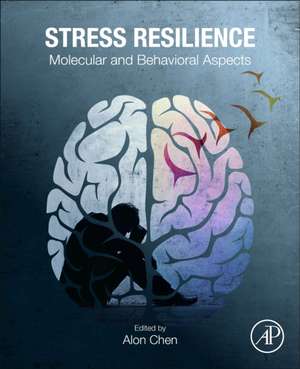Stress Resilience: Molecular and Behavioral Aspects
Editat de Alon Chenen Limba Engleză Paperback – noi 2019
This unique and timely book will be a go-to resource for neuroscientists and biological psychiatrists who want to improve their understanding of the consequences of stress and on how some people are able to avoid it.
- Approaches resilience as a process rather than as a static trait
- Provides basic molecular knowledge on the potential associations between resilience phenomenon and biochemical balance
- Presents thorough coverage of both the genetic and environmental factors that contribute to resilience
Preț: 691.41 lei
Preț vechi: 910.25 lei
-24% Nou
Puncte Express: 1037
Preț estimativ în valută:
132.31€ • 141.48$ • 110.31£
132.31€ • 141.48$ • 110.31£
Carte tipărită la comandă
Livrare economică 10-24 aprilie
Preluare comenzi: 021 569.72.76
Specificații
ISBN-13: 9780128139837
ISBN-10: 0128139838
Pagini: 390
Dimensiuni: 191 x 235 mm
Editura: ELSEVIER SCIENCE
ISBN-10: 0128139838
Pagini: 390
Dimensiuni: 191 x 235 mm
Editura: ELSEVIER SCIENCE
Public țintă
Advanced students and researchers in biological psychiatry, behavioral neuroscience, cognitive neuroscience, neuroendocrinology, and psychologyCuprins
1. A life-course, epigenetic perspective on resilience in brain and body
2. Cognitive and behavioral components of resilience to stress
3. Resilience as a process instead of a trait
4. The brain mineralocorticoid receptor: A resilience factor for psychopathology?
5. GABAB receptors and stress resilience: A tale of two isoforms
6. Sex differences in the programming of stress resilience
7. Active resilience in response to traumatic stress
8. Rhythms of stress resilience
9. Mitochondrial function and stress resilience
10. Understanding resilience: Biological approaches in at-risk populations
11. Stress resilience as a consequence of early-life adversity
12. Mechanisms by which early-life experiences promote enduring stress resilience or vulnerability
13. Child abuse and neglect: Stress responsivity and resilience
14. How genes and environment interact to shape risk and resilience to stress-related psychiatric disorders
15. Molecular characterization of the resilient brain: Transcriptional and epigenetic mechanisms
16. The role of the CRF-Urocortin system in stress resilience
17. Intergenerational transmission of stress vulnerability and resilience
18. stress and its effects across generations
19. Corticolimbic stress-regulatory circuits, hypothalamo-pituitary-adrenocortical adaptation and resilience
20. Biomarkers of resilience and susceptibility in rodent models of stress
21. Maladaptive learning and the amygdala - prefrontal circuit
22. Endocannabinoid signaling and stress resilience
2. Cognitive and behavioral components of resilience to stress
3. Resilience as a process instead of a trait
4. The brain mineralocorticoid receptor: A resilience factor for psychopathology?
5. GABAB receptors and stress resilience: A tale of two isoforms
6. Sex differences in the programming of stress resilience
7. Active resilience in response to traumatic stress
8. Rhythms of stress resilience
9. Mitochondrial function and stress resilience
10. Understanding resilience: Biological approaches in at-risk populations
11. Stress resilience as a consequence of early-life adversity
12. Mechanisms by which early-life experiences promote enduring stress resilience or vulnerability
13. Child abuse and neglect: Stress responsivity and resilience
14. How genes and environment interact to shape risk and resilience to stress-related psychiatric disorders
15. Molecular characterization of the resilient brain: Transcriptional and epigenetic mechanisms
16. The role of the CRF-Urocortin system in stress resilience
17. Intergenerational transmission of stress vulnerability and resilience
18. stress and its effects across generations
19. Corticolimbic stress-regulatory circuits, hypothalamo-pituitary-adrenocortical adaptation and resilience
20. Biomarkers of resilience and susceptibility in rodent models of stress
21. Maladaptive learning and the amygdala - prefrontal circuit
22. Endocannabinoid signaling and stress resilience
Recenzii
"Hans Selye, in his seminal 1936 note to Nature, introduced the “general adaptation syndrome. That is, the ability of the organism to adapt itself to new conditions: the basis for our understanding of stress resilience. Alon Chen (Editor), a brilliant stress neuroscientist, has recruited top experts to submit 22 chapters that make this book a valuable, cutting edge contribution to stress resilience. I strongly commend “Stress Resilience for fundamental and clinical research scientists as well as students and clinicians, especially in the fields of Neuroscience and molecular neurobiology and genetics, Neurology, Medicine, Endocrinology, Psychiatry, Psychology and related disciplines." -- George Fink (MD, DPhil, FRCPE, FRSB, FRSE) Professorial Research Fellow, the Florey Institute of Neuroscience and Mental Health, University of Melbourne, Victoria, Australia
